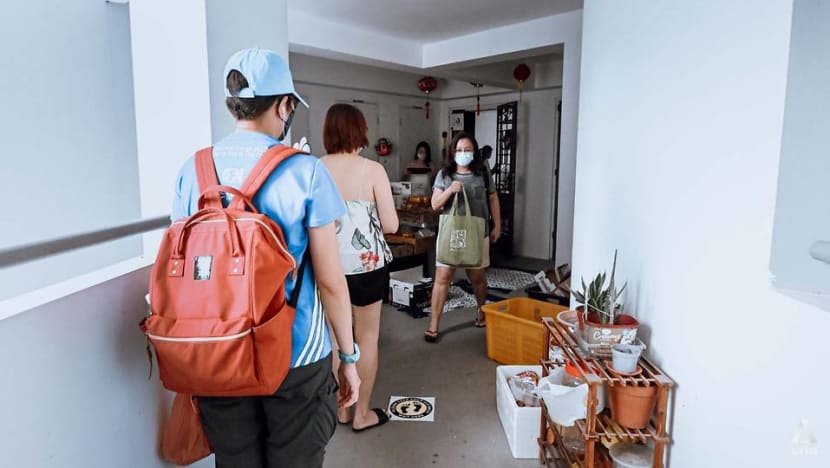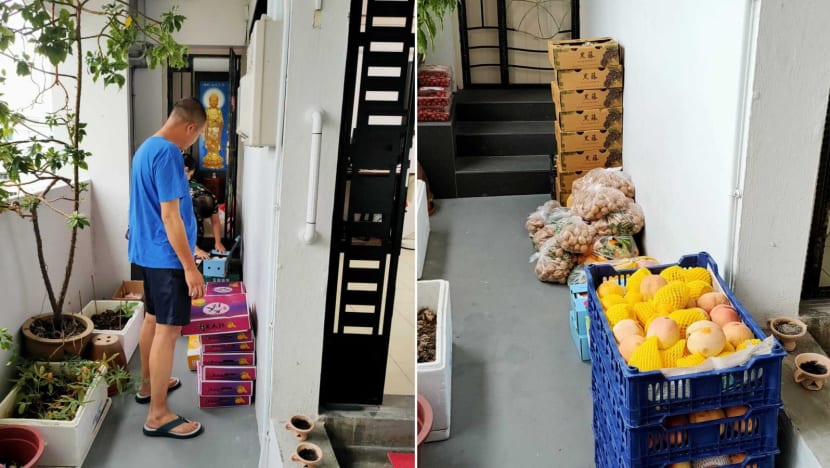Some make nothing, others can earn S$1,000 a month: Group buy organisers on why they do it
Three group buy organisers tell CNA about how much they earn from their side hustles and the work it takes to get the goods.

SINGAPORE: Group buy volumes are not what they used to be during the COVID-19 pandemic, but organisers who continue say they do so in order to support small local businesses and help participants save.
For three organisers who spoke to CNA, group buying is a side hustle on top of full-time jobs. While one did manage to make some money, the other two said they earned just enough to cover their costs.
After CNA reported on the nightmare experience of a group buy organiser's neighbour, questions were raised about how much money these organisers make and whether they should be allowed to run these activities out of their homes.
Home-based businesses do not require approval from authorities but are subject to certain conditions, such as not bringing "extraneous traffic" and no frequent loading and unloading of goods, according to the Housing Board's website.
But as group buying is not considered a business, these conditions do not apply.
CNA spoke to group buy organisers to understand more about what motivates them, how they cover business costs and what can be done to improve operations.
NO EARNINGS VS S$1,000 A MONTH
Ms Irene Ng, 50, who organises the iheartSK group buy in Sengkang, does not make any money from group buy activities.
The full-time administrative executive usually organises four to eight group buys a month. During festive occasions, this can go up to 12 times a month.
Her pool of participants numbers more than 260, and she does not charge them any fees.
"As food enthusiasts, my buyers are aware that we can benefit from bulk purchases," she said. "My intention is to give back to the community, and my buyers frequently express their gratitude for my efforts."
Collections are hosted at her HDB flat, where she is "fortunate to possess a corridor space of my own".
"Up to this point, none of my neighbours have expressed any concerns regarding the placement of my group buy items outside my corridor.
"I make it a priority to maintain substantial walking space for my neighbours and diligently (keep) the area as tidy as possible," she said, adding that she pays attention not to obstruct fire-fighting access.
Another organiser, Ms Michelle Lim, 37, was making S$1,000 (US$740) a month at the height of her activities during the pandemic, when she was hosting group buys every day.
She started organising group buys as she liked trying different foods, and continued when she found that she could save on delivery costs and make some money.
Unlike other organisers CNA spoke to, Ms Lim charges each participant an administrative fee of S$2 to S$3. She introduced the fee as she felt the work involved was “quite tedious”.
There are about 200 people in her WhatsApp chat group, and she estimates about 10 to 20 people participate in each group buy, hosted at her landed house in the Newton-Bukit Timah area.
Ms Lim was unemployed when she started organising group buys but now works as a wedding planner, and estimates that her group buys have dwindled to once a month.
A DIFFERENT WAY FORWARD
During the pandemic, group buys sprung up islandwide as a way of getting around community movement restrictions.
Last year, the government announced an Alliance for Action to facilitate group buying in the heartlands, co-led by HDB and the People’s Association.
Group buying has benefits such as encouraging interaction between residents and supporting small businesses, a media release on the initiative said.
But Mr Winson Lee, co-founder of Group Buys SG, has already noticed a pattern of more group buy organisers becoming “quieter” and seeming to “die off” as post-pandemic life continues.
A check by CNA found 30 group buy accounts on Instagram that appeared to have become inactive, with no new posts since at least the start of 2023.
Mr Lee's platform – one of Singapore's largest group buy organisers with more than 6,000 subscribers on Telegram – could represent a different way forward for those still standing.
Group Buys SG has fully transitioned from a host-collection system to islandwide delivery in order to differentiate itself from smaller, community group buy organisers.
It is also a registered business in wholesale trade, listed as a secondary trade under Mr Lee's design consultancy where he works full-time.
Mr Lee, 35, started group buying during the pandemic "circuit breaker" in 2020. His neighbours swiftly piled on orders for a delivery of egg tarts that he was organising, alerting him to a gap in the market.
He described Group Buys SG as a "social enterprise" that does not make a profit. He does not pay himself or his team of 10 to 15 volunteers a salary, and any money made goes back into the business.
"We earn zero," he said. "The way we look at how we earn is ... how much savings we make for the customer, and also how (many) man-hours are saved (by consolidating orders)."
Vendors are not charged a commission and buyers are not charged administrative fees. Instead, business costs are covered by charging vendors to list their products for sale.
This can range from S$88 for a one-time mention on social media channels, to S$288 for a seven-day listing and group purchase organised by Mr Lee's team.
What Mr Lee does have is market share, which he hopes to use to transition Group Buys SG into a profit-making outfit that helps small businesses reach ready buyers and get insights from customer data.
Having transitioned to a delivery system, he does not experience issues with hosting collection points and does not see a need for more government regulation.
Where he thinks the government can step in is as a “bridge” between group buy platforms and small businesses, and help the latter get online.
Similarly, both Ms Lim and Ms Ng did not see any areas where their group buy activities would improve from government intervention.

FOOD SAFETY CONCERNS
However, food safety is one area where the law might already come into play.
Mr Lee said his customers have complained about food safety concerns at other group buys, such as frozen food being left outside the host’s flat.
On the other hand, Ms Lim said she has faced issues with customers not collecting their purchases and leaving them at her house.
The Singapore Food Agency (SFA) said on its website that it considers group buy activities involving food as private arrangements that do not require a licence.
But group buy organisers buying food from overseas are considered importers and required to be licensed with SFA to bring in commercial shipments of food.
“Group buy organisers who are handling food product purchases are encouraged to be mindful of the food safety practices to ensure that food safety risks are managed,” SFA added.
It advises consumers to collect and store food promptly, and request the host to store the food in a refrigerator or freezer, as appropriate, if a delay in collection is expected.
Lawyer Ng Yuan Siang of Eugene Thuraisingam LLP said it may still be possible for a group buy host to be liable if a consumer falls sick after eating food purchased through him or her.
He pointed to Section 15 of the Sale of Food Act (SOFA), which prohibits a person from selling food that he or she knows is unsafe and/or unsuitable.
“There is no distinction between registered and unregistered businesses under the SOFA. Rather, the key question is whether the group buy organiser ‘sold’ the food in question,” he said.
“It is possible that the courts may interpret the group buy organiser’s actions as falling within this ambit,” he added.
“My understanding of the SOFA is that assuming that the group buy organiser’s acts constitute ‘selling’, for the purposes of determining liability it would be immaterial that the food may have become unsafe owing to the buyer’s delay in collection.”

















